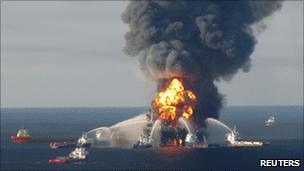Transocean says BP 'largely to blame for Gulf spill'
- Published

The Deepwater Horizon blast killed 11 people and caused one of the worst oil spills in history
Transocean, the owner of the Deepwater Horizon rig that leaked millions of gallons of oil into the Gulf of Mexico, has largely blamed BP for the disaster.
In a report into last year's spill, Swiss-based Transocean said the UK oil giant failed to properly assess and communicate the risks around the well.
Transocean and BP - which owns the actual well - continue to be locked in legal dispute over who is to blame.
BP said it was studying Transocean's report.
The explosion in April 2010 killed 11 workers and resulted in oil leaking into the Gulf of Mexico for three months.
The Macondo well, about a mile underneath the Deepwater Horizon, was finally sealed in September.
'Poor design'
Transocean's report comes two months after a study by the US Coast Guard said Transocean contributed to the disaster because of the company's lax safety culture, and poorly maintained equipment on the Deepwater Horizon.
BP also says Transocean was partly to blame and is suing the Swiss company - the world's largest offshore drilling contractor - for $40bn (£25bn).
Transocean also counters in its report that BP used a poor well design, which it says led to the failure of the cement around the well casing.
It says it was this which allowed gas to escape and reach the rig, which caused the explosion.
Transocean also claims that BP and contractor Halliburton did not adequately test the quality of the cement used around the well.
Last month, one of the other owners of the well agreed to contribute to BP's compensation fund to settle claims relating to the oil spill.
Japanese firm Moex Offshore, which owns 10% of the well, said it would put $1.065bn (£660m) into the fund.
The final US government report - the National Commission on the BP Deepwater Horizon Oil Spill and Offshore Drilling - found that several companies had been at fault for the disaster, although it said BP had overall responsibility.